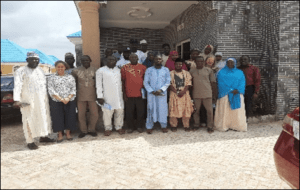Reflecting on My CCT Journey in Kebbi State

By Nafisa Abubakar Zaki – Gender, Social Inclusion & Community Engagement Advisor – IHP Kebbi State, Nigeria
The importance of girl-child education cannot be over emphasized. Yet, it is an issue in northern Nigeria. In Kebbi, for example, 26.1% of girls complete primary school as opposed to 35.9%; for secondary school its 12.9% and 24.4% respectively (MICS, 2011).
One of the main objectives of conditional cash transfer programs as stated by UNICEF in 2018, is to promote girl-child education and to complement government’s effort in educating children. Cash transfer programs can help empower families and improve girls’ enrolment in schools (The Guardian, 2018).
To me, an educated girl is one of the key instruments and a driving force to eradicate illiteracy, poverty, gender-based violence, maternal and child death, communal crisis, fistula, HIV/AIDS, and above all early marriage. However, educating a child must go beyond enrollment to actual attendance and eventual completion.
In Kebbi, IHP and lead gender and social inclusion partner WI-HER, facilitated a 2-day conditional cash transfer roundtable review meeting to explore options with the Kebbi State Ministry of Health, Ministry of Education, Ministry of Women Affairs and Social Development, Ministry of Budget and Economic Planning, and PROACT-OXFAM to determine if existing cash transfer programs can also address girls’ retention in school, and help reduce child marriage.
In my opinion, Nigeria has received large investments from the global health community and there are various cash transfer programs in the Kebbi State, yet they have had little impact especially on MNCH. To sustain investments in the health sector and continue to improve health outcomes, the State will need to improve budget execution and expenditure, increase domestic funding for health, increase local capacity, and find local solutions to persistent challenges.
During the CCT roundtable review meeting, synergy was created between stakeholders and managers of all CCT programs in the State (and further, I learned more about the potential reach of CCT programs). We learned that cash transfer programs in Kebbi State vary depending on the Ministry or organization that leads the implementation. Some are conditional while others are non-conditional cash transfer program(s). By establishing strong systems, Kebbi State will be better able to achieve (without financial hardship) sustained, equitable access to quality, high-impact reproductive, maternal, newborn, and child health plus nutrition and malaria (RMNCH+NM) services responsive to people’s needs.
We also learned that marginalized groups (like fistula clients and childbirth spacing clients) were often not included in cash transfer programs. The meeting’s dialogue led to the recommended that marginalized groups should be included in among the beneficiaries to reduce their poverty level, encourage continuous patronage of health services, and encourage others to patronize such services. Participants also agreed that all funds for cash transfer programs should be in one basket managed by State Ministry of Budget and Economic Planning for proper and uniform implementation.
I believe that if implemented well, CCT programs can address girls’ retention in school, and thus reduce child marriage in Kebbi State and Nigeria as a whole.
The USAID Integrated Health Program (IHP), led by Palladium, currently provides technical assistance to three States in Nigeria – Kebbi, Bauchi, and Sokoto – to strengthen health systems and improve access to and quality of RMNCH+NM and primary health care services. Expert gender integration and social inclusion partner, WI-HER, LLC, leads efforts that promote equitable services that reach the most marginalized populations while working to advance IHP goals and objectives.